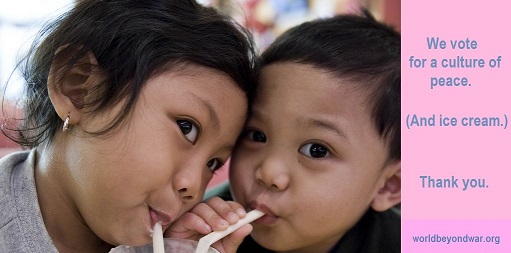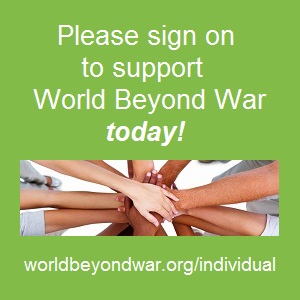(This is section 54 of the World Beyond War white paper A Global Security System: An Alternative to War. Continue to preceding | following section.)

(Please retweet this message, and support all of World Beyond War’s social media campaigns.)
The foregoing material might be likened to the hardware of an Alternative Global Security System. It dealt with the actual hardware of war and the institutions that support it and institutional reforms necessary to manage conflict without large-scale interstate or civil violence. The following material is the necessary software to run it. It addresses what Thomas Merton called the “climate of thought” that allows politicians and everyone else to prepare for and carry out massive violence.
Put in the simplest possible terms, a peace culture is a culture that promotes peaceable diversity. Such a culture includes lifeways, patterns of belief, values, behavior, and accompanying institutional arrangements that promote mutual caring and well-being as well as an equality that includes appreciation of difference, stewardship, and equitable sharing of the resources. . . . It offers mutual security for humankind in all its diversity through a profound sense of species identity as well as kinship with the living earth. There is no need for violence.
Elise Boulding (Founding figure of Peace and Conflict Studies)

A culture of peace is contrasted with a warrior culture, also known as a dominator society, where warrior gods instruct the people to create hierarchies of rank so that men dominate other men, men dominate women, there is constant competition and frequent physical violence and nature is seen as something to be conquered. In a warrior culture, safety is only for those individuals or nations that are at the top, if they can stay there. No society is completely one or the other, but in today’s world the tilt is toward the warrior societies, making necessary the growth of a culture of peace if humanity is to survive. Societies that socialize their children for aggressive behavior make wars more likely, and in a vicious circle, wars socialize people for aggression.
Every relationship of domination, of exploitation, of oppression is by definition violent, whether or not the violence is expressed by drastic means. In such a relationship, dominator and dominated alike are reduced to things – the former dehumanized by an excess of power, the latter by a lack of it. And things cannot love.
Paulo Freire (Educator)
In 1999 the United Nations General Assembly approved a Programme of Action on a Culture of Peace.note1 Article I further defines it:
A culture of peace is a set of values, attitudes, traditions and modes of behaviour and ways of life based on:
(a) Respect for life, ending of violence and promotion and practice of nonviolence through education, dialogue and cooperation;
(b) Full respect for the principles of sovereignty, territorial integrity and political independence of States and non-intervention in matters which are essentially within the domestic jurisdiction of any State, in accordance with the Charter of the United Nations and international law;
(c) Full respect for and promotion of all human rights and fundamental freedoms;
(d) Commitment to peaceful settlement of conflicts;
(e) Efforts to meet the developmental and environmental needs of present and future generations;
(f) Respect for and promotion of the right to development;
(g) Respect for and promotion of equal rights and opportunities for women and men;
(h) Respect for and promotion of the right of everyone to freedom of expression, opinion and information;
(i) Adherence to the principles of freedom, justice, democracy, tolerance, solidarity, cooperation, pluralism, cultural diversity, dialogue and understanding at all levels of society and among nations; fostered by an enabling
The General Assembly identified eight action areas:
2. Promoting sustainable economic and social development.
3. Promoting respect for all human rights.
4. Ensuring equality between women and men.
5. Fostering democratic participation.
6. Advancing understanding, tolerance and solidarity.
7. Supporting participatory communication and the free flow of information and knowledge.
8. Promoting international peace and security.
The Global Movement for the Culture of Peace is a partnership of groups from civil society that have banded together to promote a culture of peace. Part of the work is to tell a new story.
(Continue to preceding | following section.)
We want to hear from you! (Please share comments below)
How has this led you to think differently about alternatives to war?
What would you add, or change, or question about this?
What can you do to help more people understand about these alternatives to war?
How can you take action to make this alternative to war a reality?
Please share this material widely!
Related posts
See other posts related to “Creating a Culture of Peace”:
* “Telling a New Story”
* “The Unprecedented Peace Revolution of Modern Times”
* “Debunking Old Myths about War”
* “Planetary Citizenship: One People, One Planet, One Peace”
* “Spreading and Funding Peace Education and Peace Research”
* “Cultivating Peace Journalism”
* “Encouraging the Work of Peaceful Religious Initiatives”
See full table of contents for A Global Security System: An Alternative to War
Notes:
1. The valuable ideals of the United Nations and its Culture of Peace initiative need to be acknowledged despite the UN’s organizational imperfection outlined earlier. (return to main article)












5 Responses
I wonder if you are familiar with Art of Hosting. We are a global community teaching how to create safe, welcoming spaces for the difficult conversations that lead to peace. It is participatory leadership, turning Heros to Hosts. There are about 150 global stewards in the world eager to collaborate with communities and help them to ask the powerful questions that will inspire them to create cultures of peace.
http://www.artofhosting.org/home/
Thanks for sharing this, Dawn. It is startling to begin to realize — to me, at least — that if we want to accomplish “big” peace (e.g. at the international level) we are going to have to become practitioners of “personal” peace (i.e. in each and every one of our interactions with other people).
For many people — well, for me, at least — this requires a very intentional effort, and one that is not easy. (But its an effort, the consequences of which are its own reward.)
A related set of ideas I found helpful: http://heatherplett.com/2015/03/hold-space/
My name is Ali Mussa Mwadini and I am the Founder and current Executive Secretary of the NGO Zanzibar Peace, Truth & Transparency Association (ZPTTA). Our NGO is committed to the promotion of peace via increased negotiation, reconciliation and dialogue. We promote forgiveness and advocate for Human Rights, Gender Equality, Good governance and the Rule of law. ZPTTA is a non-profit NGO registered in Zanzibar, Tanzania.
As executive Secretary, I am committed voluntarily & full time to do all Administrative works in the Organization. Among other activities in our Organization, including Organization monthly meetings, Board meeting and all administrative works. Preparation of Peace Report & training manual, participating in our village meetings on Fridays with Muslim Leaders & on Sundays with Christian Leaders discussing True Culture Peace & Peace training. I do very often sit with Political Leaders to work on Peace Issue in Zanzibar Community.
Among many duties which are assigned to me full time are in Voluntary Basis are as follows:
Developing Strong Leadership Skills, I accept and seeks guidance from colleagues and Professionals
Specific responsibilities
Committed as my to days’ day actives in the Organization all Administrative works.
To Organize Trainings, Workshops, Seminars and open lectures with the Zanzibar community & other Institutions
Working with Board (including Zanzibar Community)and staff to develop
and implement a strategic influencing programme in Peace & Human Rights
Ensure, with the Finance Sub-Committee, that ZPTTA NGO has
Sound financial procedures for managing and disbursing funds, and
Managing risk
To provide the awareness for politicians on Zanzibar traditional Peace, Democracy and historical heritages system against the politics system in bring dimensions of the politics.
Increase interaction among and between civil society actors and government involved in peace building activities. Contribute to knowledge generation and sharing within Zanzibar and globally.
Good to work for peace
My honor to coordinate the work and activities of world beyond war in South Sudan..
I’m art therapist using drama for healing
What is your email address to which I can send some of my writings?